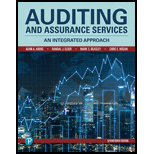
a.
Locate annual proxy statement and summary of CEO compensation for 2017 and identify the total amount and component of the chairman and chief executive officer’s total compensation from DEF 14A Filing from SEC’s website.
b.
State one
c.
State one audit procedure the auditor would perform to test occurrence objective related to the awarding of the chairman and CEO’s stock awards and stock option/stock appreciation rights (SAR).
d.
Identify the auditor test for fair value estimation of the stock option /stock option rights.
e.
Explain the importance of balance related presentation audit related objective for stock based compensation.
f.
Locate CEO pay ratio section and identify the ratio of CEO pay to median employee for 2017 and summarize the methodology used to calculate ratio
Want to see the full answer?
Check out a sample textbook solution
Chapter 20 Solutions
Auditing And Assurance Services
- Principles of Accounting Volume 2AccountingISBN:9781947172609Author:OpenStaxPublisher:OpenStax CollegeBusiness/Professional Ethics Directors/Executives...AccountingISBN:9781337485913Author:BROOKSPublisher:Cengage
 Auditing: A Risk Based-Approach (MindTap Course L...AccountingISBN:9781337619455Author:Karla M Johnstone, Audrey A. Gramling, Larry E. RittenbergPublisher:Cengage Learning
Auditing: A Risk Based-Approach (MindTap Course L...AccountingISBN:9781337619455Author:Karla M Johnstone, Audrey A. Gramling, Larry E. RittenbergPublisher:Cengage Learning





